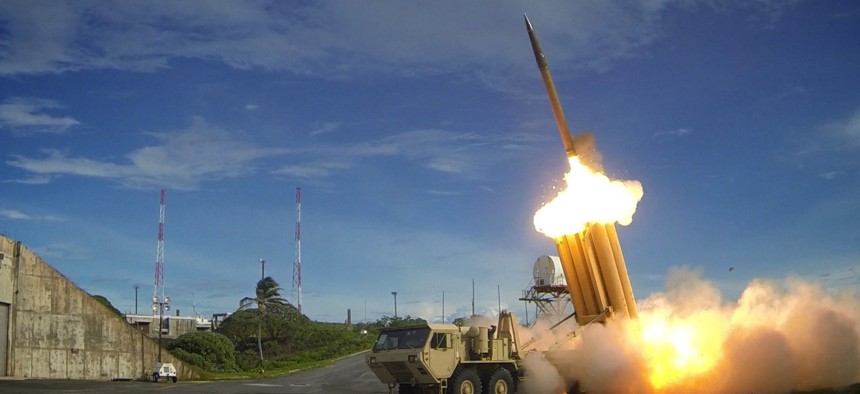Lockheed fears L3Harris will block access to Aerojet’s rockets

In 2022, Lockheed Martin picked Aerojet Rocketdyne to make the rocket engines for its next batch of THAAD anti-missile interceptors. U.S. Army
Lockheed Martin has begun making investments in other rocket makers amid its concern over what L3Harris Technologies' agreement to buy Aerojet Rocketdyne means.
LE BOURGET, France—Lockheed Martin has told the Pentagon and Federal Trade Commission that it worries that L3Harris Technologies’ proposed acquisition of Aerojet Rocketdyne would block its access to rocket motors needed for its missiles.
“We are also now actively investing and looking to partner to begin standing up another source for solid rocket motor production,” Lockheed COO Frank St. John said in a Tuesday interview at the Paris Air Show.
L3Harris declined to comment specifically about Lockheed’s comments.
“We are in an FTC process and expect the transaction to close the second half of 2023,” a company spokesperson said.
St. John said Lockheed, whose own attempt to buy Aerojet was blocked last year, has sent DOD and FTC “very detailed” letters about its concerns.
“What we're looking for is for them to engage with us in an agreement that would solidify their position as a merchant supplier,” he said. “Failing that, we're asking the [Defense] Department to put some provisions in a deal that would guarantee…access to the technology not only for us, but for everyone else that needs it too.”
St. John said Lockheed initially believed L3Harris’ proposed purchase would be beneficial because it would help Aerojet, which has long struggled to deliver quality rocket motors.
“We reached out to [L3Harris] to attempt to secure their commitment to be a merchant supplier of propulsion, to not only us, but to the rest of the missile primes in the business,” St. John said. “When I say a ‘merchant supplier of propulsion,’ I'm talking about a continuation of pricing consistent with what we've seen in the past, continued access to priority for resources and manufacturing, and then also commitment to protect intellectual property.”
But he said Lockheed has not “been able to secure any kind of agreement” from L3Harris for continued supply.
Earlier this week, Raytheon Technologies CEO Greg Hayes, who opposed Lockheed’s acquisition of Aerojet, said he wasn’t thrilled with L3Harris’ acquiring Aerojet. Still, Hayes said he believed L3Harris owning Aerojet would improve the quality of the rocket-maker’s products.
Lockheed and Raytheon account for more than half of Aerojet’s annual sales. Executives from both companies say that Aerojet has struggled to deliver quality rocket motors. The timing of Aerojet’s struggles come as the Pentagon and its allies want to drastically increase production of missiles to replenish the thousands of weapons given to Ukraine over the past year.
“We're concerned that we've got some risk now in our ability to deliver to our customers because of their unwillingness to commit to be a merchant supplier,” St. John said.
The FTC is still scrutinizing L3Harris’ $4.7 billion acquisition of Aerojet. L3Harris CEO Chris Kubasik has said the deal would allow L3Harris to invest in Aerojet’s facilities. He also has argued the deal would increase competition.
St. John said Lockheed says it put a request for information out to rocket suppliers and that it has received responses from U.S.-based startups and international propulsion companies.
“We're evaluating about a half a dozen of them and probably by the end of the summer, we'll be in a position to make an announcement on our way forward,” he said.
